Alpha Maid Is This A Queue LP (AD 93)
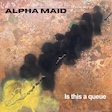 Let’s kick this off with a grotesque proportional analogy: Warp Records is to The Uncanny X-Men as AD 93 is to The New Mutants. I say that as a person who hasn’t read a Marvel comic since childhood, yet I know in my heart there’s something to it, seeing as the AD 93 roster is unconventionally skilled in its own unique and unprecedented ways yet beholden to a larger history of avant-garde, electronic, UK-centric artists. Amazingly, the label’s handful of guitar-wielding artists might even be the strangest of the bunch, case in point Alpha Maid. It’s the name that South London guitarist / vocalist / producer Leisha Thomas has chosen for herself, and Is This A Queue is her delightfully baffling full-length debut. It almost sounds like she’s completely unfamiliar with traditional song-form, which I mean as a sincere compliment. How else to explain why someone would open their album with “6-9”, four minutes of a slow industrial post-punk drum-loop and little else? Or lay down the ambivalent guitar stabs and sparse spoken vocals over Valentina Magaletti’s wild percussive trip on “Why We Have To Move”? Or pair the 4AD-meets-emo strum with clashing AutoTuned vocals in “On Smoke”?? None of it makes any commercial sense, or even typical “experimental” sense, which is a rare achievement for anyone putting together an album of songs centered around an instrument as established as the electric guitar. I can’t point to a better song to explain the mood of London’s weird 2025 vanguard than album-closer “Palimpsest”, featuring AD 93 alum Coby Sey’s lyrical flow, Ben Vince’s bizarrely processed saxophone and Thomas’s noisy no-wave guitar. By the time the rest of us catch up, there’s no doubt Alpha Maid will be onto something else.
Let’s kick this off with a grotesque proportional analogy: Warp Records is to The Uncanny X-Men as AD 93 is to The New Mutants. I say that as a person who hasn’t read a Marvel comic since childhood, yet I know in my heart there’s something to it, seeing as the AD 93 roster is unconventionally skilled in its own unique and unprecedented ways yet beholden to a larger history of avant-garde, electronic, UK-centric artists. Amazingly, the label’s handful of guitar-wielding artists might even be the strangest of the bunch, case in point Alpha Maid. It’s the name that South London guitarist / vocalist / producer Leisha Thomas has chosen for herself, and Is This A Queue is her delightfully baffling full-length debut. It almost sounds like she’s completely unfamiliar with traditional song-form, which I mean as a sincere compliment. How else to explain why someone would open their album with “6-9”, four minutes of a slow industrial post-punk drum-loop and little else? Or lay down the ambivalent guitar stabs and sparse spoken vocals over Valentina Magaletti’s wild percussive trip on “Why We Have To Move”? Or pair the 4AD-meets-emo strum with clashing AutoTuned vocals in “On Smoke”?? None of it makes any commercial sense, or even typical “experimental” sense, which is a rare achievement for anyone putting together an album of songs centered around an instrument as established as the electric guitar. I can’t point to a better song to explain the mood of London’s weird 2025 vanguard than album-closer “Palimpsest”, featuring AD 93 alum Coby Sey’s lyrical flow, Ben Vince’s bizarrely processed saxophone and Thomas’s noisy no-wave guitar. By the time the rest of us catch up, there’s no doubt Alpha Maid will be onto something else.
Cairo Pythian Pressure Treated Cross LP (Industry Standards)
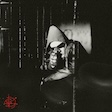 The last few years have done a number on all of us – who doesn’t have a friend that recently went off one of the many deep ends currently available? Case in point is Cairo Pythian. We last heard from him in 2015 with Touched, a devious glam-noir album that arrived ahead of the curve, and now he’s back, cosplaying like a Judgment Night extra on the cover. While my ears remain open for a Cairo Pythian rap/rock hybrid, Pressure Treated Cross doesn’t diverge from his prior formula, though he seems more willing than ever to follow his fascinations down the rabbit hole. Vocally, he still kinda sounds like early Marilyn Manson (a good thing in my book), whereas the music seems to fuse the lost-mind abjection of ’90s Coil with the aesthete synth-pop of Total Control’s final years. It’s music led by an unreliable narrator, which makes for an exciting listen; certain tracks eschew pop-song structures in favor of funhouse mirrors, but Cairo Pythian always grabs the wheel before careening off the cliff entirely. He seems to be writing with the understanding that either no-one or everyone is watching, which leads to song titles like “My Pregnant Girl”, “Bent From The Benzos”, “Trans Human Kiss” and “Diary Of A Pussy Fiend”. I assume he means well, but let’s be real, there’s gotta be some alarming Blu-rays in his personal collection.
The last few years have done a number on all of us – who doesn’t have a friend that recently went off one of the many deep ends currently available? Case in point is Cairo Pythian. We last heard from him in 2015 with Touched, a devious glam-noir album that arrived ahead of the curve, and now he’s back, cosplaying like a Judgment Night extra on the cover. While my ears remain open for a Cairo Pythian rap/rock hybrid, Pressure Treated Cross doesn’t diverge from his prior formula, though he seems more willing than ever to follow his fascinations down the rabbit hole. Vocally, he still kinda sounds like early Marilyn Manson (a good thing in my book), whereas the music seems to fuse the lost-mind abjection of ’90s Coil with the aesthete synth-pop of Total Control’s final years. It’s music led by an unreliable narrator, which makes for an exciting listen; certain tracks eschew pop-song structures in favor of funhouse mirrors, but Cairo Pythian always grabs the wheel before careening off the cliff entirely. He seems to be writing with the understanding that either no-one or everyone is watching, which leads to song titles like “My Pregnant Girl”, “Bent From The Benzos”, “Trans Human Kiss” and “Diary Of A Pussy Fiend”. I assume he means well, but let’s be real, there’s gotta be some alarming Blu-rays in his personal collection.
Chopping Block Disfigured 7″ (Blood Soaked)
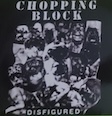 Topping my “records that would’ve made my year-end best-of had I heard them a few days earlier” list is Disfigured by Chopping Block. Yes, that Chopping Block, the one that released a sole seven-inch titled Grizzly Fetish in 1991 alongside other extreme hardcore acts that helped formulate what was later to be understood as power-violence. There are eight songs here, some of which go back as early as 1984, all of which were recently recorded and released by guitarist Dave Keck on the same Blood Soaked Records label that released their first EP thirty-four years ago. Someway somehow, Disfigured is one of the most urgent and ferocious hardcore records I’ve heard all year! Chopping Block haven’t lost a step, and I would argue they’ve tightened their songwriting and upped the brutality – it’s kind of astonishing. These songs are in league with Crossed Out, with breakneck shifts and psychotic breakdowns redolent of No Comment, No Less, Iron Lung and even Crumbsuckers. If this was a brand new band, I’d be stunned by the flawless authenticity on display, but I’m honestly maybe even more stunned that this is a group of guys who were around for the advent of the style and they still manage to completely nail such a thrilling and extreme form of hardcore-punk after a multi-decade hiatus. Highly recommended!
Topping my “records that would’ve made my year-end best-of had I heard them a few days earlier” list is Disfigured by Chopping Block. Yes, that Chopping Block, the one that released a sole seven-inch titled Grizzly Fetish in 1991 alongside other extreme hardcore acts that helped formulate what was later to be understood as power-violence. There are eight songs here, some of which go back as early as 1984, all of which were recently recorded and released by guitarist Dave Keck on the same Blood Soaked Records label that released their first EP thirty-four years ago. Someway somehow, Disfigured is one of the most urgent and ferocious hardcore records I’ve heard all year! Chopping Block haven’t lost a step, and I would argue they’ve tightened their songwriting and upped the brutality – it’s kind of astonishing. These songs are in league with Crossed Out, with breakneck shifts and psychotic breakdowns redolent of No Comment, No Less, Iron Lung and even Crumbsuckers. If this was a brand new band, I’d be stunned by the flawless authenticity on display, but I’m honestly maybe even more stunned that this is a group of guys who were around for the advent of the style and they still manage to completely nail such a thrilling and extreme form of hardcore-punk after a multi-decade hiatus. Highly recommended!
Copiers Drama / Anxiety 12″ (Future Heart Works)
 Louisville’s Copiers get conceptual (but not too conceptual) on this fun new two-song twelve-inch single. The premise is thus: throw a single spoken-word into a loop pedal so that the band can cook something up around it. The plainspoken “Drama” is met with a shimmying bass-line / drum rhythm, and the guitar mostly meanders in and around it as four “drama”s descend in perpetuity. “Anxiety” prefers to skitter than to groove, perhaps finding some inspiration in the definition of the word they chose for this extended jam. The repetitive vocal samples calls to mind some of Bill Orcutt’s programmed music of the last few years, as well as Moin’s pensive post-hardcore techniques which have also center sampled spoken-word. Orcutt and Moin both seem a little too artfully-minded compared to what Copiers are doing here though, which feels far looser and less restricted, closer perhaps to Oren Ambarchi’s Stacte Karaoke EPs wherein he sets up karaoke backing tracks and shreds on guitar over top. I’ll have to check my Oblique Strategies deck to see if there’s a “rock-band jam over a vocal sample” card in there, but even if not, I’m sure Brian Eno would approve of the curious musical prompt Copiers developed here.
Louisville’s Copiers get conceptual (but not too conceptual) on this fun new two-song twelve-inch single. The premise is thus: throw a single spoken-word into a loop pedal so that the band can cook something up around it. The plainspoken “Drama” is met with a shimmying bass-line / drum rhythm, and the guitar mostly meanders in and around it as four “drama”s descend in perpetuity. “Anxiety” prefers to skitter than to groove, perhaps finding some inspiration in the definition of the word they chose for this extended jam. The repetitive vocal samples calls to mind some of Bill Orcutt’s programmed music of the last few years, as well as Moin’s pensive post-hardcore techniques which have also center sampled spoken-word. Orcutt and Moin both seem a little too artfully-minded compared to what Copiers are doing here though, which feels far looser and less restricted, closer perhaps to Oren Ambarchi’s Stacte Karaoke EPs wherein he sets up karaoke backing tracks and shreds on guitar over top. I’ll have to check my Oblique Strategies deck to see if there’s a “rock-band jam over a vocal sample” card in there, but even if not, I’m sure Brian Eno would approve of the curious musical prompt Copiers developed here.
Distoromance Déjà Si Mort 7″ (Galakthorrö)
 A new artist on the Galakthorrö roster is noteworthy and scarce, so why not toss the debut Distoromance single in your black velvet rucksack? I am along for the ride with this label til one of us perishes, with the understanding that whatever they release will be highly discerning in quality, sensuality and morbidity. That’s certainly the case with “Déjà Si Mort”, its gothic drama dripping like black wax around a patient, frightened beat. The vocals (presumably from member “Sandrine”, not the one named “François”) are some of the most enchantingly tuneful that Galakthorrö has ever released, and they elevate the track to a top billing on any respectable “music by and for haunted dolls” playlist. “Ornières” is under the power of its hypnotic synth throb; Sandrine’s vocals are a little more forceful here and, to be fair, perhaps at odds with the music’s video-game-dungeon pulse. It’s charmingly stilted in a way that reminds me of Belgian cold-wavers Bernthöler, though Distoromance are clearly French – these are red-wine synths, no doubt. I’d love to hear more, and if Galakthorrö’s track record means anything, there’s a good chance I’ll be able to when Distoromance return with an LP in two or three well-considered years.
A new artist on the Galakthorrö roster is noteworthy and scarce, so why not toss the debut Distoromance single in your black velvet rucksack? I am along for the ride with this label til one of us perishes, with the understanding that whatever they release will be highly discerning in quality, sensuality and morbidity. That’s certainly the case with “Déjà Si Mort”, its gothic drama dripping like black wax around a patient, frightened beat. The vocals (presumably from member “Sandrine”, not the one named “François”) are some of the most enchantingly tuneful that Galakthorrö has ever released, and they elevate the track to a top billing on any respectable “music by and for haunted dolls” playlist. “Ornières” is under the power of its hypnotic synth throb; Sandrine’s vocals are a little more forceful here and, to be fair, perhaps at odds with the music’s video-game-dungeon pulse. It’s charmingly stilted in a way that reminds me of Belgian cold-wavers Bernthöler, though Distoromance are clearly French – these are red-wine synths, no doubt. I’d love to hear more, and if Galakthorrö’s track record means anything, there’s a good chance I’ll be able to when Distoromance return with an LP in two or three well-considered years.
Dopplereffekt Metasymmetry 12″ (Tresor)
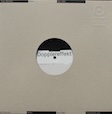 Living legends Dopplereffekt have dwelled in the distant future for three decades now, and while one could forgive them for easing into a comfortable stasis, that’s simply not their style. They’re restless techno scientists, finding new usages for time-tested technologies, which includes the kinetic electro-dance and alien-ambient styles that comprise this four-track EP. “Time Modulation-Graviton Pulse” is Kraftwerk subjected to the violence of a Terminator 2 chase scene; “Multiverse Wavefunction” is the beat-less, revitalizing energy-pool that restores those robotic mannequins to full functionality. The pattern follows on the second side, with the rubbery thwock of “Collapse of Simultaneity” waking up all the sleeping clones in their aquatic cells as the THX-quality atmospherics of “Olbers Paradox” survey the damaged battlefield, taking stock of losses through angelic vocal sweeps and glimmering synth pads. As always, the music of Dopplereffekt is clinically precise and body moving, but theoretical and impish too, a poltergeist caught in the mainframe. Who else could release a collection with the academic title of Gesamtkunstwerk and fill it with tracks called “Pornoactress”, “Pornoviewer” and “Plastiphilia”? Dopplereffekt know the truth: robots, as it turns out, need as much sex as the next guy.
Living legends Dopplereffekt have dwelled in the distant future for three decades now, and while one could forgive them for easing into a comfortable stasis, that’s simply not their style. They’re restless techno scientists, finding new usages for time-tested technologies, which includes the kinetic electro-dance and alien-ambient styles that comprise this four-track EP. “Time Modulation-Graviton Pulse” is Kraftwerk subjected to the violence of a Terminator 2 chase scene; “Multiverse Wavefunction” is the beat-less, revitalizing energy-pool that restores those robotic mannequins to full functionality. The pattern follows on the second side, with the rubbery thwock of “Collapse of Simultaneity” waking up all the sleeping clones in their aquatic cells as the THX-quality atmospherics of “Olbers Paradox” survey the damaged battlefield, taking stock of losses through angelic vocal sweeps and glimmering synth pads. As always, the music of Dopplereffekt is clinically precise and body moving, but theoretical and impish too, a poltergeist caught in the mainframe. Who else could release a collection with the academic title of Gesamtkunstwerk and fill it with tracks called “Pornoactress”, “Pornoviewer” and “Plastiphilia”? Dopplereffekt know the truth: robots, as it turns out, need as much sex as the next guy.
Dridge Wind LP (Drin)
 “Dridge” could be a great word for the stagnant filth composed of organic and inorganic material that congeals outside of industrial processing facilities, but it’s also well-suited to this West Philly doom-metal trio. They build upon the epic sludge of 2023’s Dying Out with Wind, another spiteful march to the gallows. There are three tracks here (respective track times: 17:02, 4:58, 19:20), which gather the down-tuned tones of Warhorse and Asunder and whip them into disgruntled action. The music is sluggish, the riffs are simplistic and unmemorable, the vocals are a Rolf / Cookie Monster hybrid, and before you know it, Dridge have swallowed up a half hour of your life in their primordial din. Even their phaser pedals are operating on the slowest possible settling! It’s all about the totality of these lengthy tracks and their many peaks and valleys, a foul atmosphere befitting Mark Erskine’s inhospitable landscape painting on the cover. Dridge conjure that ancient desolation in their music, to the point that when the first painfully glorious guitar solo hits in “Inner Sanctum Of The Icy Realm (Wind)” (ten minutes in?), it feels well-earned, a cache of weaponry discovered on a craggy cliff. Those cave fairies that restore your hearts back to full health? Sorry, those went extinct centuries ago.
“Dridge” could be a great word for the stagnant filth composed of organic and inorganic material that congeals outside of industrial processing facilities, but it’s also well-suited to this West Philly doom-metal trio. They build upon the epic sludge of 2023’s Dying Out with Wind, another spiteful march to the gallows. There are three tracks here (respective track times: 17:02, 4:58, 19:20), which gather the down-tuned tones of Warhorse and Asunder and whip them into disgruntled action. The music is sluggish, the riffs are simplistic and unmemorable, the vocals are a Rolf / Cookie Monster hybrid, and before you know it, Dridge have swallowed up a half hour of your life in their primordial din. Even their phaser pedals are operating on the slowest possible settling! It’s all about the totality of these lengthy tracks and their many peaks and valleys, a foul atmosphere befitting Mark Erskine’s inhospitable landscape painting on the cover. Dridge conjure that ancient desolation in their music, to the point that when the first painfully glorious guitar solo hits in “Inner Sanctum Of The Icy Realm (Wind)” (ten minutes in?), it feels well-earned, a cache of weaponry discovered on a craggy cliff. Those cave fairies that restore your hearts back to full health? Sorry, those went extinct centuries ago.
The Educated Fools Tantric Decapitation: 69 Mins. Of Trichotomy And Liquefaction 2xLP (Total Punk)
 No longer satisfied with swapping out wacky new definite articles in front of their name, Retail Simps have donned new costumes entirely as The Educated Fools. I can’t quite follow the plot – whatever Easter Eggs and inside jokes are lodged in their new aliases, the song titles and cover diploma, it’s all lost on me – but as for their debaucherous rock n’ roll, it makes the same profound sense as a chicken that can play Tic Tac Toe. Imagine if John Candy and Black Randy formed a band for the sole purpose of irritating their neighbors, sweating through their suits-and-ties and ruining their roommate’s saxophone by drinking egg nog out of it. There’s at least one “whop-bobba-loo-bop” to be discovered here, though if you could crack Tantric Decapitation open like a fortune cookie, that’s the message I’d expect to find printed within. As they stretch out over two full LPs, the songwriting isn’t as inspired or tight as the last couple Retail Simps albums, but I’d be an uneducated fool if I thought airbrushed songwriting was their intended goal. No, this is a full-scale intestinal clean-out of all their trashy rock mania – now that you’re nice and empty, it’s time to schedule those colonoscopies, gents!
No longer satisfied with swapping out wacky new definite articles in front of their name, Retail Simps have donned new costumes entirely as The Educated Fools. I can’t quite follow the plot – whatever Easter Eggs and inside jokes are lodged in their new aliases, the song titles and cover diploma, it’s all lost on me – but as for their debaucherous rock n’ roll, it makes the same profound sense as a chicken that can play Tic Tac Toe. Imagine if John Candy and Black Randy formed a band for the sole purpose of irritating their neighbors, sweating through their suits-and-ties and ruining their roommate’s saxophone by drinking egg nog out of it. There’s at least one “whop-bobba-loo-bop” to be discovered here, though if you could crack Tantric Decapitation open like a fortune cookie, that’s the message I’d expect to find printed within. As they stretch out over two full LPs, the songwriting isn’t as inspired or tight as the last couple Retail Simps albums, but I’d be an uneducated fool if I thought airbrushed songwriting was their intended goal. No, this is a full-scale intestinal clean-out of all their trashy rock mania – now that you’re nice and empty, it’s time to schedule those colonoscopies, gents!
Emer Fog LP (Short Span)
 Lots of evil people out there these days trying to convince us that machines can have souls, yet the only time I’ve recently found myself considering this possibility is while listening to Fog. It’s the first full-length from Brussels-based sound artist Marija Rasa under her Emer moniker, and you might also find yourself charmed by the warm and prismatic tones that emanate from these seven tracks. From a layman’s perspective, imagine Autechre and Vladislav Delay given free range to manipulate and remix Jessie Ware and Sade stems, the after-hours melodies plucked apart and smartly reassembled. Much as Pole took a scalpel to classic dub does Emer carve paper dolls from soulful trip-hop elements, similar to something you’d enjoy on the False Aralia label. The sounds are abstracted and dislocated, but Emer materializes her tracks with lopsided rhythms and casually-looping patterns – for as unusual as “Nobody Speaks” is, there’s no denying that it’s a song, not an experimental process. My favorite cut might be “The Evergreen Fog” – its repeating melodic motif is as soft and tear-stained as Prince’s favorite pillow – but the whole album is a joy to behold, a heavy-lidded downtempo trip through a deep sea of blankets (to borrow a phrase from John Mayer’s creepiest hit, “Your Body Is A Wonderland”).
Lots of evil people out there these days trying to convince us that machines can have souls, yet the only time I’ve recently found myself considering this possibility is while listening to Fog. It’s the first full-length from Brussels-based sound artist Marija Rasa under her Emer moniker, and you might also find yourself charmed by the warm and prismatic tones that emanate from these seven tracks. From a layman’s perspective, imagine Autechre and Vladislav Delay given free range to manipulate and remix Jessie Ware and Sade stems, the after-hours melodies plucked apart and smartly reassembled. Much as Pole took a scalpel to classic dub does Emer carve paper dolls from soulful trip-hop elements, similar to something you’d enjoy on the False Aralia label. The sounds are abstracted and dislocated, but Emer materializes her tracks with lopsided rhythms and casually-looping patterns – for as unusual as “Nobody Speaks” is, there’s no denying that it’s a song, not an experimental process. My favorite cut might be “The Evergreen Fog” – its repeating melodic motif is as soft and tear-stained as Prince’s favorite pillow – but the whole album is a joy to behold, a heavy-lidded downtempo trip through a deep sea of blankets (to borrow a phrase from John Mayer’s creepiest hit, “Your Body Is A Wonderland”).
Equipment Pointed Ankh Eggs A Little Late LP (Petty Bunco)
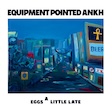 It’s been a banner year for Ryan Davis and friends, and what better way to cap it off than with a new one from the most welcoming and open-minded project he’s a part of: Equipment Pointed Ankh. My understanding is that this is mostly Jim Marlowe’s baby, but we’re not dealing with a crew of self-obsessed egotists – if there’s a glare in any one of the ten(-plus) members’ faces, the others will offer up their sunglasses without a second thought. For the uninitiated, the ‘Ankh sound is omnivorous and free-spirited, an ultra-talented mixed bag of characters (and instrumentation) that will follow any thread of an idea out of their own sheer amusement (and subsequently, ours). That means that a horn section might bubble up over some folksy guitars, or a kraut-rock groove could stumble into some funny sound effects; how about one person reads poetry written by a different band member over hummingbird strings and dub drums? It all happens here, like a big-band Blues Control with unabated studio access, or The Olivia Tremor Control meets The Scientist At Cropped Out Festival, though more often like neither. I still can’t get over the inventiveness of 2023’s From Inside The House, or the hilariously inappropriate cover for 2019’s Live (I think about that guy’s predicament way more than I should), so I look forward to eventually deciphering what they’re on about this time around with Eggs A Little Late.
It’s been a banner year for Ryan Davis and friends, and what better way to cap it off than with a new one from the most welcoming and open-minded project he’s a part of: Equipment Pointed Ankh. My understanding is that this is mostly Jim Marlowe’s baby, but we’re not dealing with a crew of self-obsessed egotists – if there’s a glare in any one of the ten(-plus) members’ faces, the others will offer up their sunglasses without a second thought. For the uninitiated, the ‘Ankh sound is omnivorous and free-spirited, an ultra-talented mixed bag of characters (and instrumentation) that will follow any thread of an idea out of their own sheer amusement (and subsequently, ours). That means that a horn section might bubble up over some folksy guitars, or a kraut-rock groove could stumble into some funny sound effects; how about one person reads poetry written by a different band member over hummingbird strings and dub drums? It all happens here, like a big-band Blues Control with unabated studio access, or The Olivia Tremor Control meets The Scientist At Cropped Out Festival, though more often like neither. I still can’t get over the inventiveness of 2023’s From Inside The House, or the hilariously inappropriate cover for 2019’s Live (I think about that guy’s predicament way more than I should), so I look forward to eventually deciphering what they’re on about this time around with Eggs A Little Late.
Frigöra Fullständig Frigörelse LP (General Speech)
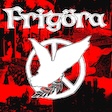 As we near total reissue completion of ’80s Japanese hardcore, we can now safely move into the ’90s – no MCR Company release is safe. Frigöra hailed from Kawasaki City in the mid ’90s, and their form of noisy hardcore-crust carries no signs of maturation or evolution from the style’s earliest practitioners (Confuse, Mob 47, LSD, Extreme Noise Terror). Fullständig Frigörelse captures the group’s twelve-inch and seven-inch EPs, the split EP with Diskonto and three unreleased tracks for good measure (including a Mob 47 cover), presented with the class and exquisite graphic design we’ve come to expect from General Speech. That means there’s a big booklet full of lyrics, which illuminate Frigöra’s staunch animal-rights stance, and allow me to now sing along to “Ett Dyurförsök (Stinker)”. The mid ’90s are generally considered a fallow period for molten-hot d-beat crust, even by Japanese standards, but Frigöra are a shining exception, maintaining their convulsive drumming and scalding guitar sound across these four different recording sessions. Those of us with weaker constitutions may need to tap out after one side, but anyone among us who ever accidentally poked themselves by sitting on their own spiked leather jacket will relish Fullständig Frigörelse from start to finish.
As we near total reissue completion of ’80s Japanese hardcore, we can now safely move into the ’90s – no MCR Company release is safe. Frigöra hailed from Kawasaki City in the mid ’90s, and their form of noisy hardcore-crust carries no signs of maturation or evolution from the style’s earliest practitioners (Confuse, Mob 47, LSD, Extreme Noise Terror). Fullständig Frigörelse captures the group’s twelve-inch and seven-inch EPs, the split EP with Diskonto and three unreleased tracks for good measure (including a Mob 47 cover), presented with the class and exquisite graphic design we’ve come to expect from General Speech. That means there’s a big booklet full of lyrics, which illuminate Frigöra’s staunch animal-rights stance, and allow me to now sing along to “Ett Dyurförsök (Stinker)”. The mid ’90s are generally considered a fallow period for molten-hot d-beat crust, even by Japanese standards, but Frigöra are a shining exception, maintaining their convulsive drumming and scalding guitar sound across these four different recording sessions. Those of us with weaker constitutions may need to tap out after one side, but anyone among us who ever accidentally poked themselves by sitting on their own spiked leather jacket will relish Fullständig Frigörelse from start to finish.
Zach Hill & Lucas Abela Bag Of Max Bag Of Cass LP (Warp)
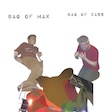 If you’re going to collaborate with the guy who smashes oily glass against his face, you have but one option: go harder than you’ve ever gone before. Phenom drummer Zach Hill clearly lusts for such a challenge, and we all know Lucas Abela (aka Justice Yeldham) has no sonic conscience, so let’s hope whoever greenlit this project at Warp has an airtight employment contract. A populist crowd-pleaser this ain’t! Bag Of Max Bag Of Cass is unrelenting digital noise from start to finish, a tornado of wasps riding a tsunami across an active volcano (inside a giant dishwasher… on fire?). There are occasional moments of coherent drumming (on mostly electronic kits?) buried in the sonic sludge, giving it a Black Pus feel (see “Combat Boxes” and “Bent On 13”), but the album ultimately gushes forward like Hanatarash’s physically violent freakouts had they been delivered via Russell Haswell’s most evil laptop. It’s as thick and imposing as your finest harsh-noise-wall artists, but the constant, dizzying activity is what pushes Bag Of Max Bag Of Cass to unforeseen greatness, the duo operating at thrillingly reckless speeds. No need for Abela to smash the glass on his face for this one – this music has already shattered it.
If you’re going to collaborate with the guy who smashes oily glass against his face, you have but one option: go harder than you’ve ever gone before. Phenom drummer Zach Hill clearly lusts for such a challenge, and we all know Lucas Abela (aka Justice Yeldham) has no sonic conscience, so let’s hope whoever greenlit this project at Warp has an airtight employment contract. A populist crowd-pleaser this ain’t! Bag Of Max Bag Of Cass is unrelenting digital noise from start to finish, a tornado of wasps riding a tsunami across an active volcano (inside a giant dishwasher… on fire?). There are occasional moments of coherent drumming (on mostly electronic kits?) buried in the sonic sludge, giving it a Black Pus feel (see “Combat Boxes” and “Bent On 13”), but the album ultimately gushes forward like Hanatarash’s physically violent freakouts had they been delivered via Russell Haswell’s most evil laptop. It’s as thick and imposing as your finest harsh-noise-wall artists, but the constant, dizzying activity is what pushes Bag Of Max Bag Of Cass to unforeseen greatness, the duo operating at thrillingly reckless speeds. No need for Abela to smash the glass on his face for this one – this music has already shattered it.
Idea Fire Company Hot Enough For You? LP (Horn Of Plenty)
 There’s a good chance Idea Fire Company are your favorite deeply-underground experimental band’s favorite deeply-underground experimental band. Their debut album came out a year before Nirvana’s Nevermind, and while the global response to these albums differed wildly, Idea Fire Company have always sounded fresh, and if not ahead of time, then wholly outside of it. Consistently releasing music since then, Hot Enough For You? is their 21st or 22nd album depending how you’re keeping score, and it’s as restlessly creative as anything else in their vast archives. The core duo of Scott Foust and Karla Borecky are joined by Robert Beerman on percussion, Matt Krefting on alto sax, Mike Popovich on bass, and Timothy Shortell on clarinet this time, but don’t let that big-band lineup fool you – these songs are full of the same eerie, repetitive, ominously creaky vibes that have permeated the Idea Fire Company oeuvre through their history. Some of these tracks seem downright painful to play; the closing title track is case in point, a disorienting slow-motion lurch that reeks of nausea. It’s like a jazz-bar house band rehearsing the music of Earth and Joshua Abrams Natural Information Society, but substituting the right notes with wrong ones, and refusing to let go. Or more simply, it’s another uncompromising success – in this way (and the water-themed art), kinda like Nirvana’s Nevermind.
There’s a good chance Idea Fire Company are your favorite deeply-underground experimental band’s favorite deeply-underground experimental band. Their debut album came out a year before Nirvana’s Nevermind, and while the global response to these albums differed wildly, Idea Fire Company have always sounded fresh, and if not ahead of time, then wholly outside of it. Consistently releasing music since then, Hot Enough For You? is their 21st or 22nd album depending how you’re keeping score, and it’s as restlessly creative as anything else in their vast archives. The core duo of Scott Foust and Karla Borecky are joined by Robert Beerman on percussion, Matt Krefting on alto sax, Mike Popovich on bass, and Timothy Shortell on clarinet this time, but don’t let that big-band lineup fool you – these songs are full of the same eerie, repetitive, ominously creaky vibes that have permeated the Idea Fire Company oeuvre through their history. Some of these tracks seem downright painful to play; the closing title track is case in point, a disorienting slow-motion lurch that reeks of nausea. It’s like a jazz-bar house band rehearsing the music of Earth and Joshua Abrams Natural Information Society, but substituting the right notes with wrong ones, and refusing to let go. Or more simply, it’s another uncompromising success – in this way (and the water-themed art), kinda like Nirvana’s Nevermind.
Nape Neck The Shallowest End LP (Dot Dash Sounds / OCCII, Amsterdam / Red Wig)
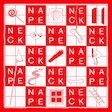 If Dislocation Dance wasn’t already the name of a band, it’d be well-suited for this rambunctious post-punk group. Nape Neck’s EP collection from earlier this year introduced the group to an audience beyond their native Leeds, and The Shallowest End comes in even hotter, a three-way scuffle between bass, drums and guitar. And like a true communist guild, they all share singing duties! Claire Adams’s bass and Bobby Glew’s guitar are at constant odds, and drummer Kathy Gray occasionally picks a side, or sticks it to them both. To be clear though, this isn’t improvised: their off-kilter post-punk is in league with Erase Errata, Huggy Bear and The Pop Group, though they refuse to leave an inch of breathing room in these songs (as if Sleetmute Nightmute met at a jazz conservatory). Even as it falls apart in the middle of “The Rabbit”, someone takes it upon themselves to blow a safety whistle over the deconstructed din, over and over. The trio save The Shallowest End from solidifying into a mass of impenetrable math-rock through the obvious fun they’re having; the performance is tight but not to the point of discomfort. Nape Neck clearly relish their time together and the fact that they can pull off such nonlinear post-punk tunes, both inspired and inspiring.
If Dislocation Dance wasn’t already the name of a band, it’d be well-suited for this rambunctious post-punk group. Nape Neck’s EP collection from earlier this year introduced the group to an audience beyond their native Leeds, and The Shallowest End comes in even hotter, a three-way scuffle between bass, drums and guitar. And like a true communist guild, they all share singing duties! Claire Adams’s bass and Bobby Glew’s guitar are at constant odds, and drummer Kathy Gray occasionally picks a side, or sticks it to them both. To be clear though, this isn’t improvised: their off-kilter post-punk is in league with Erase Errata, Huggy Bear and The Pop Group, though they refuse to leave an inch of breathing room in these songs (as if Sleetmute Nightmute met at a jazz conservatory). Even as it falls apart in the middle of “The Rabbit”, someone takes it upon themselves to blow a safety whistle over the deconstructed din, over and over. The trio save The Shallowest End from solidifying into a mass of impenetrable math-rock through the obvious fun they’re having; the performance is tight but not to the point of discomfort. Nape Neck clearly relish their time together and the fact that they can pull off such nonlinear post-punk tunes, both inspired and inspiring.
November Növelet Electrical LP (Galakthorrö)
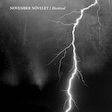 Kind of ironic that long-standing German gloom-wave duo November Növelet decided to call their new album Electrical, with lighting streaking across a dark sky on the cover, considering how perished it sounds. This record is electrical in the same sense that a dying charger plugged into a faulty socket is electrical, its cord fraying to the point of exposing its wiry guts. As November Növelet, Mr. and Mrs. Arafna have always reveled in the empty space between heartbeats, and Electrical might be their most subdued effort yet, an empty hospital bed of a record. Of course, this is part of what makes them so alluring: the restraint, the below-freezing electronics, the soft touch with which they deliver their doomed prophecies. Their aesthetic really hasn’t changed since they started the group back in the mid ’90s – you could listen to the title track here (or any of them, really) and enjoy many of the same greyscale oscillations and ghostly keyboard settings found on any of their prior releases. There’s a comfort in that for fans such as myself, the Arafnas unwavering dedication to their distinctive artistry, though it wouldn’t be a comfort if their music was mediocre. If you’re the member of your family most likely to linger on the beauty of a dead crow laying in a fallow field, I have good news for you – Galakthorrö has once again resumed shipping to the United States.
Kind of ironic that long-standing German gloom-wave duo November Növelet decided to call their new album Electrical, with lighting streaking across a dark sky on the cover, considering how perished it sounds. This record is electrical in the same sense that a dying charger plugged into a faulty socket is electrical, its cord fraying to the point of exposing its wiry guts. As November Növelet, Mr. and Mrs. Arafna have always reveled in the empty space between heartbeats, and Electrical might be their most subdued effort yet, an empty hospital bed of a record. Of course, this is part of what makes them so alluring: the restraint, the below-freezing electronics, the soft touch with which they deliver their doomed prophecies. Their aesthetic really hasn’t changed since they started the group back in the mid ’90s – you could listen to the title track here (or any of them, really) and enjoy many of the same greyscale oscillations and ghostly keyboard settings found on any of their prior releases. There’s a comfort in that for fans such as myself, the Arafnas unwavering dedication to their distinctive artistry, though it wouldn’t be a comfort if their music was mediocre. If you’re the member of your family most likely to linger on the beauty of a dead crow laying in a fallow field, I have good news for you – Galakthorrö has once again resumed shipping to the United States.
Oh Mr James I’m Not Here EP 12″ (Analogical Force)
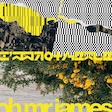 Rephlex Records coined the term “braindance” back in the ’90s to simultaneously mock and evolve one of the worst genre names of all time, IDM (“intelligent dance music”, woof). It’s that foundational mix of hard electro beats and dazzling synth-play that shines through the new EP from Welsh producer Oh Mr James. Opener “Sometimes” is universally undeniable, a wild filleting of Speak & Spell voices over a punchy beat of Juan Atkins-ian origin. The title track follows suit, electro in Drexciya’s school of thought (which allows for silly playfulness to poke through). The beats cannot be shamed by even the stodgiest of electronic music enthusiasts – in this track’s case, it’s elevated to greatness by the variety of oddball voices reciting the track title. “The Bishop”‘s sprightly, off-kilter melody over propulsive breaks nods to Aphex Twin; “Ground Control Acid” floods the zone with rubbery kicks and processed vocals as thick and wet as paint. And there are two more tracks of equal regard! It’s impossible to imagine Oh Mr James not having the time of his life making these tunes, texting unmastered clips to his mates at 3:00 AM and expecting immediate emoji reactions in validation of his freewheeling braindance style. See if “Sometimes” doesn’t make you feel the same way.
Rephlex Records coined the term “braindance” back in the ’90s to simultaneously mock and evolve one of the worst genre names of all time, IDM (“intelligent dance music”, woof). It’s that foundational mix of hard electro beats and dazzling synth-play that shines through the new EP from Welsh producer Oh Mr James. Opener “Sometimes” is universally undeniable, a wild filleting of Speak & Spell voices over a punchy beat of Juan Atkins-ian origin. The title track follows suit, electro in Drexciya’s school of thought (which allows for silly playfulness to poke through). The beats cannot be shamed by even the stodgiest of electronic music enthusiasts – in this track’s case, it’s elevated to greatness by the variety of oddball voices reciting the track title. “The Bishop”‘s sprightly, off-kilter melody over propulsive breaks nods to Aphex Twin; “Ground Control Acid” floods the zone with rubbery kicks and processed vocals as thick and wet as paint. And there are two more tracks of equal regard! It’s impossible to imagine Oh Mr James not having the time of his life making these tunes, texting unmastered clips to his mates at 3:00 AM and expecting immediate emoji reactions in validation of his freewheeling braindance style. See if “Sometimes” doesn’t make you feel the same way.
Orange Whip Orange Whip 7″ (100% Breakfast)
 My immediate thought is that Orange Whip should do a split with Yellowcake, and then I realize I’m simply describing the ingredients to a classic Hostess cupcake. Remind me to not write these reviews on an empty stomach! Orange Whip are a new punk band outta Cambridge, in kind of the best position any band will ever be in – releasing their first seven-inch EP after a demo debut. Punk is a game of inches, and I like where Orange Whip are positioned: the vocals are shouty-sassy, and the music toes the line between speedy garage and first-wave Cali punk. If you want to look back to the permanent dead-zone of music (which is to say, between fifteen and twenty years prior to the current moment), I’m reminded of Clorox Girls and Brain F≠, two bands who probably also looked back to The Wipers or Angry Samoans or The Gits or Urinals or The Donnas to help develop their sound in the truest manner possible. My favorite of these five tracks is probably “Pepsi Clear”, partially for the title (am I crazy or was it actually called Crystal Pepsi?) and mostly for the way it weaves in threads of poppy grunge, like a DIY-basement-circuit Belly that hangs out with Fucked Up whenever they come to town.
My immediate thought is that Orange Whip should do a split with Yellowcake, and then I realize I’m simply describing the ingredients to a classic Hostess cupcake. Remind me to not write these reviews on an empty stomach! Orange Whip are a new punk band outta Cambridge, in kind of the best position any band will ever be in – releasing their first seven-inch EP after a demo debut. Punk is a game of inches, and I like where Orange Whip are positioned: the vocals are shouty-sassy, and the music toes the line between speedy garage and first-wave Cali punk. If you want to look back to the permanent dead-zone of music (which is to say, between fifteen and twenty years prior to the current moment), I’m reminded of Clorox Girls and Brain F≠, two bands who probably also looked back to The Wipers or Angry Samoans or The Gits or Urinals or The Donnas to help develop their sound in the truest manner possible. My favorite of these five tracks is probably “Pepsi Clear”, partially for the title (am I crazy or was it actually called Crystal Pepsi?) and mostly for the way it weaves in threads of poppy grunge, like a DIY-basement-circuit Belly that hangs out with Fucked Up whenever they come to town.
Real Lies We Will Annihilate Our Enemies LP (Tonal Recordings)
 While other men my age exacerbate their mental illnesses by befriending AI chatbots, I choose to listen to records like We Will Annihilate Our Enemies by Real Lies, which has me convinced that I’m an Instagram-famous nineteen-year-old club-kid dating two rival drug dealers as I fly back and forth between London and Miami. Of course we can order bottle service – my absentee entertainment-lawyer father just wired me twenty Gs! This is an album that builds rich worlds around it, with the fabricated sheen and sparkle of a strip club from the Grand Theft Auto universe. Real Lies don’t simply mimic the sounds emanating within a London mega-club, they narrate them as well. I also find myself thinking of the characters and settings of HBO’s horniest young-people shows (Euphoria, I Love LA and Industry, obviously), though We Will Annihilate Our Enemies is too on-the-nose for music supervisors to actually work with. Over corporate-sounding house, big-tent UK garage, breakbeat-ambient and modern dance-pop beats, mostly male vocalists wax forlornly about lost love, the exhaustion of aesthetic sexuality, anomie for the terminally online, and cigarettes after sex over the weekend (or perhaps Cigarettes After Sex and The Weeknd). You can stay home if you want – the opening double-shot of “Loverboy” and “Towards Horses” are completely over the top and cheaply cathartic and I relish every second of them, ready to chase the Real Lies tour bus through the never-ending night.
While other men my age exacerbate their mental illnesses by befriending AI chatbots, I choose to listen to records like We Will Annihilate Our Enemies by Real Lies, which has me convinced that I’m an Instagram-famous nineteen-year-old club-kid dating two rival drug dealers as I fly back and forth between London and Miami. Of course we can order bottle service – my absentee entertainment-lawyer father just wired me twenty Gs! This is an album that builds rich worlds around it, with the fabricated sheen and sparkle of a strip club from the Grand Theft Auto universe. Real Lies don’t simply mimic the sounds emanating within a London mega-club, they narrate them as well. I also find myself thinking of the characters and settings of HBO’s horniest young-people shows (Euphoria, I Love LA and Industry, obviously), though We Will Annihilate Our Enemies is too on-the-nose for music supervisors to actually work with. Over corporate-sounding house, big-tent UK garage, breakbeat-ambient and modern dance-pop beats, mostly male vocalists wax forlornly about lost love, the exhaustion of aesthetic sexuality, anomie for the terminally online, and cigarettes after sex over the weekend (or perhaps Cigarettes After Sex and The Weeknd). You can stay home if you want – the opening double-shot of “Loverboy” and “Towards Horses” are completely over the top and cheaply cathartic and I relish every second of them, ready to chase the Real Lies tour bus through the never-ending night.
Rigorous Institution Tormentor 12″ (Roachleg)
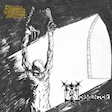 You can smell great hardcore-crust from a mile away – literally, I mean. If I don’t wash my clothes immediately after listening to Rigorous Institution’s new twelve-inch EP, I’ll probably just have to throw them away – their stench has never been more piquant than on Tormentor, an excellent seven-track EP that pairs a hideous artfulness with plain-old hardcore fury. It’s always fun when traditional-sounding hardcore bands lose their minds a little (and with it, the musical plot), but Rigorous Institution really deliver the best of both worlds here, cooking up their own Tolkien-esque sonic battlefields (darkly atmospheric synths, lengthy instrumental passages) without neglecting the meat-and-potatoes heft. Their songs pound in a manner similar to Amebix at their fastest and His Hero Is Gone at their slowest, with riffs that avoid typical Sabbathian progressions or public-domain d-beat. Flee from “Preach To The Converted”, which appears on the horizon like a modified Mad Max steamroller, or grievously sway to “Hidden Ruler (Kang Sheng)”… there’s no sunlight here, only harmful ultraviolet radiation. The Tormentor calls to mind some heinous gargoyle-faced tyrant on his throne of skulls, barking out war declarations against the feudal domains of King Diamond and Mortiis; the cover’s decrepit orc prisoner could’ve come from either battalion.
You can smell great hardcore-crust from a mile away – literally, I mean. If I don’t wash my clothes immediately after listening to Rigorous Institution’s new twelve-inch EP, I’ll probably just have to throw them away – their stench has never been more piquant than on Tormentor, an excellent seven-track EP that pairs a hideous artfulness with plain-old hardcore fury. It’s always fun when traditional-sounding hardcore bands lose their minds a little (and with it, the musical plot), but Rigorous Institution really deliver the best of both worlds here, cooking up their own Tolkien-esque sonic battlefields (darkly atmospheric synths, lengthy instrumental passages) without neglecting the meat-and-potatoes heft. Their songs pound in a manner similar to Amebix at their fastest and His Hero Is Gone at their slowest, with riffs that avoid typical Sabbathian progressions or public-domain d-beat. Flee from “Preach To The Converted”, which appears on the horizon like a modified Mad Max steamroller, or grievously sway to “Hidden Ruler (Kang Sheng)”… there’s no sunlight here, only harmful ultraviolet radiation. The Tormentor calls to mind some heinous gargoyle-faced tyrant on his throne of skulls, barking out war declarations against the feudal domains of King Diamond and Mortiis; the cover’s decrepit orc prisoner could’ve come from either battalion.
ROLROLROL Dinner LP (Ilian Tape)
 The Dinner served by German duo ROLROLROL is a wide-ranging electro buffet. Many moods are explored here, though through most of them, you’ll understand that party-rock is undoubtedly, indisputably in the house tonight. “Paper Plane” pulled me in from the jump, a dazzling arpeggio layer-cake that clocks out in under a minute, and I keep sticking around for the rest. There are laser-light-show techno cuts, inventive futurist g-funk grooves and plenty of left-field hip-hop beats, all moving at a brisk downtown pace. Feels very aligned with Flying Lotus’s Brainfeeder camp, the exuberant electro of Dorian Concept and a general hyperactivity I’d associate with Adult Swim’s bumper music of the last ten years. Some of it might go too hard, fast or weird for the general population (that squeak toy in “Popcorn” is an attention-grabber that will push some listeners too far), but then there’s “Sliders”, a b-boy chop fest of the highest order that no living human could deny. I don’t spend a lot of time with instrumental hip-hop beats, so I appreciate Ilian Tape’s gentle reminder that there’s a bright, busy world of this stuff happening at the same time as everything else. Not sure what that is on the cover – carpet, skin, the soft crust of a pie? Whatever it is, I suppose it’s Dinner.
The Dinner served by German duo ROLROLROL is a wide-ranging electro buffet. Many moods are explored here, though through most of them, you’ll understand that party-rock is undoubtedly, indisputably in the house tonight. “Paper Plane” pulled me in from the jump, a dazzling arpeggio layer-cake that clocks out in under a minute, and I keep sticking around for the rest. There are laser-light-show techno cuts, inventive futurist g-funk grooves and plenty of left-field hip-hop beats, all moving at a brisk downtown pace. Feels very aligned with Flying Lotus’s Brainfeeder camp, the exuberant electro of Dorian Concept and a general hyperactivity I’d associate with Adult Swim’s bumper music of the last ten years. Some of it might go too hard, fast or weird for the general population (that squeak toy in “Popcorn” is an attention-grabber that will push some listeners too far), but then there’s “Sliders”, a b-boy chop fest of the highest order that no living human could deny. I don’t spend a lot of time with instrumental hip-hop beats, so I appreciate Ilian Tape’s gentle reminder that there’s a bright, busy world of this stuff happening at the same time as everything else. Not sure what that is on the cover – carpet, skin, the soft crust of a pie? Whatever it is, I suppose it’s Dinner.
Save Our Children / Stunted Youth split LP (Unlawful Assembly)
 A split LP between two Texas hardcore-punk bands with names that reflect negatively towards adolescence? I’ll be there just as soon as I lace up the knockoff Doc Martens I skateboard in! Neither band seems to have much of a social-media presence (Vince McMahon smiling meme) and while a good part of the fun of any given hardcore-punk split LP is figuring out which of the two bands “wins”, Save Our Children and Stunted Youth each deserve a trophy. It’s like being beaten up by two people at the same time – how can you determine who left the worst bruises? Save Our Children (AKA S.O.C., proudly upholding the three-letter acronym hardcore band-name format) are magnificently old-school in their sonic approach, fast and down-to-earth in a way that reminds me of Ill Repute, White Cross and Neon Christ. Not even the subtlest trace of metal, just skinned-knee hardcore-punk with songs that average around a minute a piece. Stunted Youth sound exceedingly similar, even by the fine gradients with which I enjoy dissecting this perfect form of music. Maybe there’s a shade more meaty chaos on their side, as if S.O.C. found a weight-bench on the curb and started lifting while listening to Headcleaners MP3s. Stunted Youth also treat us to “Dipshit Secrets Pt. 1” and “Dipshit Secrets Pt. 2”, sounding like they skipped school to listen to Poison Idea all day. What can you learn in social studies that Kings Of Punk doesn’t already explain, anyway?
A split LP between two Texas hardcore-punk bands with names that reflect negatively towards adolescence? I’ll be there just as soon as I lace up the knockoff Doc Martens I skateboard in! Neither band seems to have much of a social-media presence (Vince McMahon smiling meme) and while a good part of the fun of any given hardcore-punk split LP is figuring out which of the two bands “wins”, Save Our Children and Stunted Youth each deserve a trophy. It’s like being beaten up by two people at the same time – how can you determine who left the worst bruises? Save Our Children (AKA S.O.C., proudly upholding the three-letter acronym hardcore band-name format) are magnificently old-school in their sonic approach, fast and down-to-earth in a way that reminds me of Ill Repute, White Cross and Neon Christ. Not even the subtlest trace of metal, just skinned-knee hardcore-punk with songs that average around a minute a piece. Stunted Youth sound exceedingly similar, even by the fine gradients with which I enjoy dissecting this perfect form of music. Maybe there’s a shade more meaty chaos on their side, as if S.O.C. found a weight-bench on the curb and started lifting while listening to Headcleaners MP3s. Stunted Youth also treat us to “Dipshit Secrets Pt. 1” and “Dipshit Secrets Pt. 2”, sounding like they skipped school to listen to Poison Idea all day. What can you learn in social studies that Kings Of Punk doesn’t already explain, anyway?
Scrabbled Plough Through The Rust LP (Wormwood Grasshopper)
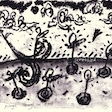 There is a small subset of Aussie indie-underground enthusiasts that gets excited by new Wormwood Grasshopper releases, and we all share the common trait of being very, very attractive and cool. The label has mostly been out-of-office for the last decade, so I appreciate that they recently put together this Scrabbled LP, mostly comprised of studio recordings from 2015. (I told you the label takes it nice and slow.) As is often the label’s predilection, Scrabbled are proudly ramshackle, songs held together by a stanked-out guitar or two as a snare drum tries to keep up admirably, and what’s that, someone brought a violin? Cool, they might as well play that too. Scrabbled’s songs land somewhere between Mad Nanna’s patience-testing deconstruction and the lively amateur pop of Alternative TV. There’s a good bit of irritation here as well, which may set Scrabbled apart from some of their cheerier peers – check “N.K.O.T.B.”‘s undiluted fury, replete with a chorus that rhymes “shit for brains” with “video games”. I’m not sure if they call it gobbing in Australia or if that’s just a British thing, but many of these songs are ripe for the members of Scrabbled to angrily spit on the floor whilst playing. A belated sadness hangs over Plough Through The Rust though, as vocalist Bek Moore passed away shortly after the recording… this album’s a worthy, if untimely, final word.
There is a small subset of Aussie indie-underground enthusiasts that gets excited by new Wormwood Grasshopper releases, and we all share the common trait of being very, very attractive and cool. The label has mostly been out-of-office for the last decade, so I appreciate that they recently put together this Scrabbled LP, mostly comprised of studio recordings from 2015. (I told you the label takes it nice and slow.) As is often the label’s predilection, Scrabbled are proudly ramshackle, songs held together by a stanked-out guitar or two as a snare drum tries to keep up admirably, and what’s that, someone brought a violin? Cool, they might as well play that too. Scrabbled’s songs land somewhere between Mad Nanna’s patience-testing deconstruction and the lively amateur pop of Alternative TV. There’s a good bit of irritation here as well, which may set Scrabbled apart from some of their cheerier peers – check “N.K.O.T.B.”‘s undiluted fury, replete with a chorus that rhymes “shit for brains” with “video games”. I’m not sure if they call it gobbing in Australia or if that’s just a British thing, but many of these songs are ripe for the members of Scrabbled to angrily spit on the floor whilst playing. A belated sadness hangs over Plough Through The Rust though, as vocalist Bek Moore passed away shortly after the recording… this album’s a worthy, if untimely, final word.
S.K.V. + CazU-23 転 -Marobashi- LP (General Speech)
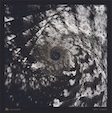 Upon listening to this album by S.K.V. + CazU-23, I received a phone call informing me that if I did not play it for someone else within seven days, the vengeful spirit of Sakevi would emerge from a reflective surface to kill me. Okay maybe that’s just The Ring‘s central plot device, but I approached this album with wariness and caution – the legendary G.I.S.M. vocalist may no longer walk among us mortals, but I can’t imagine he’s not out there wreaking havoc on some other plane of existence. 転 -Marobashi- documents a 2016 live performance of Sakevi alongside CazU-23 on noise guitar, and like any Sakevi-related material, it’s no half-measure. Sakevi delves deep, rooting out his most primal vocalizations like clogs in ancient pipes as CazU-23 sustains his unsettling timbres, an ambient drone that provides neither ambiance nor solemnity. Genre-abiding punks won’t know what to do with this besides politely nod at yet another piece of evidence that points towards Sakevi’s lunacy, and that’s fine – nothing about this record is “for everyone”. I wish I had attended this performance when it happened, but I’m thankful that none other than Hijokaidan’s Jojo Hiroshige penned the unexpectedly touching liner notes, detailing his musical relationship with Sakevi through this collaboration. I continue to hope to be proven wrong, but they really don’t make ’em like this anymore.
Upon listening to this album by S.K.V. + CazU-23, I received a phone call informing me that if I did not play it for someone else within seven days, the vengeful spirit of Sakevi would emerge from a reflective surface to kill me. Okay maybe that’s just The Ring‘s central plot device, but I approached this album with wariness and caution – the legendary G.I.S.M. vocalist may no longer walk among us mortals, but I can’t imagine he’s not out there wreaking havoc on some other plane of existence. 転 -Marobashi- documents a 2016 live performance of Sakevi alongside CazU-23 on noise guitar, and like any Sakevi-related material, it’s no half-measure. Sakevi delves deep, rooting out his most primal vocalizations like clogs in ancient pipes as CazU-23 sustains his unsettling timbres, an ambient drone that provides neither ambiance nor solemnity. Genre-abiding punks won’t know what to do with this besides politely nod at yet another piece of evidence that points towards Sakevi’s lunacy, and that’s fine – nothing about this record is “for everyone”. I wish I had attended this performance when it happened, but I’m thankful that none other than Hijokaidan’s Jojo Hiroshige penned the unexpectedly touching liner notes, detailing his musical relationship with Sakevi through this collaboration. I continue to hope to be proven wrong, but they really don’t make ’em like this anymore.
Split Apex Thoughts In 3D LP (Ever/Never)
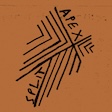 Ever/Never seems to have reduced its ambitious release schedule in 2025, but whatever they’re lacking in quantity is surely made up for by the quality of Split Apex’s debut LP. They’re a new duo out of Croydon, South London, featuring Peter Blundell (of the late great Mosquitoes) and Jussi Palmusaari. As far as experimental post-punk goes, it’s like they were conjured straight out of my dreams: a part-Sightings, part-Shadow Ring amalgam whose mutant-power crashes the WiFi router each time it yawns. Blundell unleashes some gorgeously weird bass-lines – think Jah Wobble crammed in one of those precocious British phone booths – as he mutters Tim Goss-style over Palmusaari’s beguiling array of effects. I’m reminded of those great C.I.A. Debutante records from a couple years ago, or the more inspired tracks from one of those early-industrial Vinyl On Demand boxsets that span like eight LPs. Not sure I want to go as far as to call these tracks “songs”, but there’s a coherence, or a premeditation, that has me remembering them as easily as I can identify Wolf Eyes’s “Stabbed In The Face” from its first few seconds (a neat party trick). Some people will need more than this – verses and choruses, a tidy resolution, drums – but for my money, Thoughts In 3D is exquisitely reduced, with only the strangest and most potent elements given full reign. Recommended!
Ever/Never seems to have reduced its ambitious release schedule in 2025, but whatever they’re lacking in quantity is surely made up for by the quality of Split Apex’s debut LP. They’re a new duo out of Croydon, South London, featuring Peter Blundell (of the late great Mosquitoes) and Jussi Palmusaari. As far as experimental post-punk goes, it’s like they were conjured straight out of my dreams: a part-Sightings, part-Shadow Ring amalgam whose mutant-power crashes the WiFi router each time it yawns. Blundell unleashes some gorgeously weird bass-lines – think Jah Wobble crammed in one of those precocious British phone booths – as he mutters Tim Goss-style over Palmusaari’s beguiling array of effects. I’m reminded of those great C.I.A. Debutante records from a couple years ago, or the more inspired tracks from one of those early-industrial Vinyl On Demand boxsets that span like eight LPs. Not sure I want to go as far as to call these tracks “songs”, but there’s a coherence, or a premeditation, that has me remembering them as easily as I can identify Wolf Eyes’s “Stabbed In The Face” from its first few seconds (a neat party trick). Some people will need more than this – verses and choruses, a tidy resolution, drums – but for my money, Thoughts In 3D is exquisitely reduced, with only the strangest and most potent elements given full reign. Recommended!
Tapes Photos Of My Frog 12″ (Jahtari)
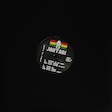 There is no misinterpreting what Jackson Bailey AKA Tapes is referring to with “Photos Of My Frog”: throughout a pleasantly fidgety digital dub, frog-croak and camera-flash sound-effects volley back and forth. That’s a taste of the ludicrous fun to be had on this new EP care of the Jahtari label, an ever-reliable source for overtly digital, mostly instrumental reggae music. “Photos Of My Frog” is the one you’ll want to play for family and friends, but the remaining three songs (two of which are supplemented by “8-bit” versions) are charmingly artificial as well. “Cleat Skank” sounds like a Donkey Kong Country island level, whereas “Cleat Skank 8-bit” cleaves the processing power by a power of three. This irreverently old-school digital style been the Jahtari MO for years now, and while Tapes sometimes strays from the digi-dub reggae script (his “Summer Jam” from 2020 is muzak-cheese of the finest grade), their frequent team-ups are guaranteed crowd-pleasers, even if the crowd is just you, your cat and your Taco Bell mobile order at one in the morning. I’m gonna fire up my Nintendo, mute the TV, throw on “Back Cramp 8-bit” and see if it gives me the confidence to finally beat Hudson’s Adventure Island.
There is no misinterpreting what Jackson Bailey AKA Tapes is referring to with “Photos Of My Frog”: throughout a pleasantly fidgety digital dub, frog-croak and camera-flash sound-effects volley back and forth. That’s a taste of the ludicrous fun to be had on this new EP care of the Jahtari label, an ever-reliable source for overtly digital, mostly instrumental reggae music. “Photos Of My Frog” is the one you’ll want to play for family and friends, but the remaining three songs (two of which are supplemented by “8-bit” versions) are charmingly artificial as well. “Cleat Skank” sounds like a Donkey Kong Country island level, whereas “Cleat Skank 8-bit” cleaves the processing power by a power of three. This irreverently old-school digital style been the Jahtari MO for years now, and while Tapes sometimes strays from the digi-dub reggae script (his “Summer Jam” from 2020 is muzak-cheese of the finest grade), their frequent team-ups are guaranteed crowd-pleasers, even if the crowd is just you, your cat and your Taco Bell mobile order at one in the morning. I’m gonna fire up my Nintendo, mute the TV, throw on “Back Cramp 8-bit” and see if it gives me the confidence to finally beat Hudson’s Adventure Island.
Teengenerate Live At The Empty Bottle LP (HoZac)
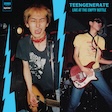 Teengenerate deserve a spot in the Japanese punk hall of fame (or any punk hall of fame, for that matter), but you know who wins this one? The Empty Bottle crowd. I’ve been lucky enough to perform at that beloved Chicago-punk institution close to a dozen times now, but I’ve never witnessed an audience like the one caught on tape at this Teengenerate show some thirty(!) years ago. This crowd is absolutely frothing at the mouth, squealing and screaming and losing their minds, a wild reaction somewhere between Showtime At The Apollo and The Beatles’s Live At The Hollywood Bowl, and Teengenerate bounce that energy right back. The recording is already hot (in a punchy, not muddy, way), and while the band’s carefree swagger remains evident on their studio recordings, Live At The Empty Bottle thrills from the two-way connection between band and audience. Originals like “Sex Cow” and “Get Me Back” are fully revved up, as if Teengenerate were flying high on the rest-stop amphetamines available back in the mid ’90s, and while I’m sad to see that they skipped their cover of The Zeros’s “Wild Weekend” this night, an unexpected rendition of The Queers’s all-timer “Kicked Out Of The Webelos” more than compensates. At one point, someone in the audience shouts “I love Japanese punk!” with sincere conviction, surely unaware that they were being recorded for posterity. Nowadays, everyone at every show is aware that they’re probably being filmed one way or another, which is one of the deep shames of our age. The best punk rock happens when no one is watching.
Teengenerate deserve a spot in the Japanese punk hall of fame (or any punk hall of fame, for that matter), but you know who wins this one? The Empty Bottle crowd. I’ve been lucky enough to perform at that beloved Chicago-punk institution close to a dozen times now, but I’ve never witnessed an audience like the one caught on tape at this Teengenerate show some thirty(!) years ago. This crowd is absolutely frothing at the mouth, squealing and screaming and losing their minds, a wild reaction somewhere between Showtime At The Apollo and The Beatles’s Live At The Hollywood Bowl, and Teengenerate bounce that energy right back. The recording is already hot (in a punchy, not muddy, way), and while the band’s carefree swagger remains evident on their studio recordings, Live At The Empty Bottle thrills from the two-way connection between band and audience. Originals like “Sex Cow” and “Get Me Back” are fully revved up, as if Teengenerate were flying high on the rest-stop amphetamines available back in the mid ’90s, and while I’m sad to see that they skipped their cover of The Zeros’s “Wild Weekend” this night, an unexpected rendition of The Queers’s all-timer “Kicked Out Of The Webelos” more than compensates. At one point, someone in the audience shouts “I love Japanese punk!” with sincere conviction, surely unaware that they were being recorded for posterity. Nowadays, everyone at every show is aware that they’re probably being filmed one way or another, which is one of the deep shames of our age. The best punk rock happens when no one is watching.
Vehicular Vehicular 12″ (False Aralia)
 Mysterious techno imprint False Aralia strikes again, and much like serial killers, they follow a pattern. With abstract black etchings centered on a white cover, the productions are attributed to a lone Izaak “IS” Schlossman, each release given a distinct artist name and title even if they all seem to flow from the same creative well. They’re all mesmerizing swings at abstract ambient/dub/techno, and the fifth release, as Vehicular, might be my favorite of the bunch. On the uniformly titled “Vehicular 01”, we get a guest vocal spot from Lucas Deleon (aka De Leon, remember that pivotal album from 2018?). It’s not fair when an artist is great at more than one thing, so I’m mad at Deleon for having the voice of an angel and keeping it a secret until now. His singing is suited for mainstream Latin pop, but instead he chose to tuck it into this blissful sway, like digital algae in shimmering tide pools. “Vehicular 02” goes instrumental, tethering that same tropical-Alva Noto atmosphere to a sturdy low-end melody, whereas the fifteen minutes of “Vehicular 03” provides only the haziest essence of what preceded it, that cloud of salt and soot that remains when a squid is rousted from its camouflaged hiding place. Like many of this year’s best electronic releases, the vinyl vanished within hours or days, but the digital is freely available to console those of us caught sleeping (or working, or hanging out with friends…).
Mysterious techno imprint False Aralia strikes again, and much like serial killers, they follow a pattern. With abstract black etchings centered on a white cover, the productions are attributed to a lone Izaak “IS” Schlossman, each release given a distinct artist name and title even if they all seem to flow from the same creative well. They’re all mesmerizing swings at abstract ambient/dub/techno, and the fifth release, as Vehicular, might be my favorite of the bunch. On the uniformly titled “Vehicular 01”, we get a guest vocal spot from Lucas Deleon (aka De Leon, remember that pivotal album from 2018?). It’s not fair when an artist is great at more than one thing, so I’m mad at Deleon for having the voice of an angel and keeping it a secret until now. His singing is suited for mainstream Latin pop, but instead he chose to tuck it into this blissful sway, like digital algae in shimmering tide pools. “Vehicular 02” goes instrumental, tethering that same tropical-Alva Noto atmosphere to a sturdy low-end melody, whereas the fifteen minutes of “Vehicular 03” provides only the haziest essence of what preceded it, that cloud of salt and soot that remains when a squid is rousted from its camouflaged hiding place. Like many of this year’s best electronic releases, the vinyl vanished within hours or days, but the digital is freely available to console those of us caught sleeping (or working, or hanging out with friends…).
Visible Light Songs For Eventide LP (Permaculture Media)
 If I think of the secret-richest artsy couple I know, and imagine who they would’ve hired to perform a live ambient set during their outdoor wedding reception’s light refreshment and cocktail hour, I keep landing on something like Visible Light. They’re a duo, Amy McNally on cello and Matthew Hiram on flute, synth, bowls, and sure, field recordings too, and as I look upon them dressed in white, peaking through a forest meadow under the sweet dappling rays of sunlight on the cover of Songs For Eventide, I can’t shake that sense of elegant matrimonial ambiance. McNally bows rich, slow tones from her cello, following patterns that sway and shift without the formal rigidness of sheet music, and Hiram’s flute adds a flavor not unlike the instrumental segments of Céline Dion’s immortal “My Heart Will Go On”, though darker, more cryptic melodies are explored as well. The range of ambient music being made right now has never been deeper and wider, from lightly-processed refrigerator hum to the dulcet, classically-informed sounds of Visible Light’s woodwinds and strings, but I encounter more of the former and less of the latter. Maybe it’s because you actually need some time-tested skill to make music like Visible Light, or maybe it’s because the sentimentality of this traditional-instrument style is more likely to accidentally drift into cornier territory. Regardless, Visible Light are a safer bet for your hallowed ceremony – Claire Rousay would probably end up DJing Euro-trance.
If I think of the secret-richest artsy couple I know, and imagine who they would’ve hired to perform a live ambient set during their outdoor wedding reception’s light refreshment and cocktail hour, I keep landing on something like Visible Light. They’re a duo, Amy McNally on cello and Matthew Hiram on flute, synth, bowls, and sure, field recordings too, and as I look upon them dressed in white, peaking through a forest meadow under the sweet dappling rays of sunlight on the cover of Songs For Eventide, I can’t shake that sense of elegant matrimonial ambiance. McNally bows rich, slow tones from her cello, following patterns that sway and shift without the formal rigidness of sheet music, and Hiram’s flute adds a flavor not unlike the instrumental segments of Céline Dion’s immortal “My Heart Will Go On”, though darker, more cryptic melodies are explored as well. The range of ambient music being made right now has never been deeper and wider, from lightly-processed refrigerator hum to the dulcet, classically-informed sounds of Visible Light’s woodwinds and strings, but I encounter more of the former and less of the latter. Maybe it’s because you actually need some time-tested skill to make music like Visible Light, or maybe it’s because the sentimentality of this traditional-instrument style is more likely to accidentally drift into cornier territory. Regardless, Visible Light are a safer bet for your hallowed ceremony – Claire Rousay would probably end up DJing Euro-trance.
Vorhex Angel Heavenly LP (Electric Outlet)
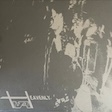 Can’t say I ever checked out JEFF The Brotherhood, what with the unappealing name and all. It’s two brothers, Jake and Jamin Orrall – yet the brotherhood is some other person named JEFF? And it’s an acronym in all caps, like some sort of supercomputer robot from the ’60s? It did not entice me then or now, but the brothers Orrall have recently joined up with guitarist Kunal Prakash for a hard reset as Vorhex Angel. If it turns out JEFF The Brotherhood sounded like this, I’m gonna kick myself, because Vorhex Angel are harsh psychedelic noise-rock in the fine tradition of High Rise, and they destroy. Some of these songs practically hit tribute-band status, but that’s fine by me – High Rise deserve to be tributed every single day, everywhere. The opening title track is a molten jam not unlike Air Conditioning at their peak, but when the rock grooves settle in (and boy do they), I’m reminded of the earliest, speed-addled Comets On Fire recordings and the heaviest Acid Mothers Temple stoner-epics (from Makoto Kawabata’s Degeneration X jersey era). “Spring” delivers Laddio Bolocko-esque thrills before the album-closing “Lemon Tree” offers a soft-swaying come-down from the heightened fury that preceded it. What’s next, are you gonna tell me that Be Your Own Pet actually sounded like Urban Waste and I need to check them out too??
Can’t say I ever checked out JEFF The Brotherhood, what with the unappealing name and all. It’s two brothers, Jake and Jamin Orrall – yet the brotherhood is some other person named JEFF? And it’s an acronym in all caps, like some sort of supercomputer robot from the ’60s? It did not entice me then or now, but the brothers Orrall have recently joined up with guitarist Kunal Prakash for a hard reset as Vorhex Angel. If it turns out JEFF The Brotherhood sounded like this, I’m gonna kick myself, because Vorhex Angel are harsh psychedelic noise-rock in the fine tradition of High Rise, and they destroy. Some of these songs practically hit tribute-band status, but that’s fine by me – High Rise deserve to be tributed every single day, everywhere. The opening title track is a molten jam not unlike Air Conditioning at their peak, but when the rock grooves settle in (and boy do they), I’m reminded of the earliest, speed-addled Comets On Fire recordings and the heaviest Acid Mothers Temple stoner-epics (from Makoto Kawabata’s Degeneration X jersey era). “Spring” delivers Laddio Bolocko-esque thrills before the album-closing “Lemon Tree” offers a soft-swaying come-down from the heightened fury that preceded it. What’s next, are you gonna tell me that Be Your Own Pet actually sounded like Urban Waste and I need to check them out too??
Ian Wellman Particularly Dangerous Situation LP (Elevator Bath)
 Less than a year after the catastrophic Los Angeles wildfires, Californian sound-artist Ian Wellman releases his first LP for Elevator Bath, a direct sonic document of that devastation. On January 7th, 2025, Wellman drove towards the fires, recorded the winds whipping the crap out of his gear, came home covered in ash and used those recordings as a base for the expansive, harshly soothing drones of Particularly Dangerous Situation. We all process grief and loss differently, but I gotta say… this one is coming a little too soon for my personal tastes. The horrific whistling winds and the crackle of flame are all too real and direct, these circumstances and tragic repercussions still being felt by an untold number of people, some of whom I call friends. Wellman is also processing this grief – I have no doubt that he’s been personally hit harder by the fires than my East Coast-residing self – and while I am glad he’s been able to turn to music to purge these emotions, it’s still too immediate for me to enjoy art inspired by this particular devastation. Maybe for others, such a listen might offer some form of catharsis, but if I’m going to enjoy some avant-garde disaster-porn, it’s going to be a techno album about the asteroid that wiped out the dinosaurs or an industrial soundtrack to Pompeii being buried alive, not a tragedy fresh enough to still have its own outstanding Gofundme campaigns.
Less than a year after the catastrophic Los Angeles wildfires, Californian sound-artist Ian Wellman releases his first LP for Elevator Bath, a direct sonic document of that devastation. On January 7th, 2025, Wellman drove towards the fires, recorded the winds whipping the crap out of his gear, came home covered in ash and used those recordings as a base for the expansive, harshly soothing drones of Particularly Dangerous Situation. We all process grief and loss differently, but I gotta say… this one is coming a little too soon for my personal tastes. The horrific whistling winds and the crackle of flame are all too real and direct, these circumstances and tragic repercussions still being felt by an untold number of people, some of whom I call friends. Wellman is also processing this grief – I have no doubt that he’s been personally hit harder by the fires than my East Coast-residing self – and while I am glad he’s been able to turn to music to purge these emotions, it’s still too immediate for me to enjoy art inspired by this particular devastation. Maybe for others, such a listen might offer some form of catharsis, but if I’m going to enjoy some avant-garde disaster-porn, it’s going to be a techno album about the asteroid that wiped out the dinosaurs or an industrial soundtrack to Pompeii being buried alive, not a tragedy fresh enough to still have its own outstanding Gofundme campaigns.


 Alright, here’s some proof that my year-end best-of lists come straight from the heart: who in their right mind would pick the same artist for best single and best album if any sort of savvy posturing came into play? If my main goal was to strategically generate clicks, I’d be looking outside of my gut for the answers, but seriously – do you want new wave or do you want the truth? BouQ arrived by storm early in the year, subtly smoother and more sensual in comparison to the forthcoming SickElixir album, which of course we didn’t know at the time. These tracks are heavyweight pop caught in a violent windstorm without sufficient shelter, the cyber-femme vocal hooks cutting through waves of hot dust and the occasional shard of wrecked industrial equipment. “Fires” is Rihanna versus Godzilla in the Las Vegas sphere as officiated by Bill Kouligas… motion-sickness-inducing techno years ahead of its time. Since Blawan’s excellent Dismantled Into Juice single (coincidentally my favorite EP in 2023, ehrm), his accompanying artwork has utilized close-range photography of domesticated animals with neon spray-paint accents. The visceral and uncanny sheep’s wool doused with jarringly artificial pigmentation here is a perfect visual complement to the music. I’m so glad Blawan continues to share his unique vision with the world.
Alright, here’s some proof that my year-end best-of lists come straight from the heart: who in their right mind would pick the same artist for best single and best album if any sort of savvy posturing came into play? If my main goal was to strategically generate clicks, I’d be looking outside of my gut for the answers, but seriously – do you want new wave or do you want the truth? BouQ arrived by storm early in the year, subtly smoother and more sensual in comparison to the forthcoming SickElixir album, which of course we didn’t know at the time. These tracks are heavyweight pop caught in a violent windstorm without sufficient shelter, the cyber-femme vocal hooks cutting through waves of hot dust and the occasional shard of wrecked industrial equipment. “Fires” is Rihanna versus Godzilla in the Las Vegas sphere as officiated by Bill Kouligas… motion-sickness-inducing techno years ahead of its time. Since Blawan’s excellent Dismantled Into Juice single (coincidentally my favorite EP in 2023, ehrm), his accompanying artwork has utilized close-range photography of domesticated animals with neon spray-paint accents. The visceral and uncanny sheep’s wool doused with jarringly artificial pigmentation here is a perfect visual complement to the music. I’m so glad Blawan continues to share his unique vision with the world.  Real talk, the album category always comes with the stiffest competition. YHWH Nailgun, Nourished By Time, Erika de Casier, Kaleidoscope… they all produced stunning records that enriched my 2025 deeply, and had any of those artists chosen to whittle their albums down into EPs, they could’ve easily topped the singles list. However, there can be only one #1 in the numerical ranking system I stubbornly cling to, and this one’s a no-brainer: SickElixir is the high point of Blawan’s career. I’m not sure how he can ever top this, and I’m scared to think he might try, as I expect to be reckoning with this record for quite a while to come. Aggressive electronic music is a hard fruit to squeeze fresh juice from, and yet Blawan is here dumping it over us like a Gatorade cooler in the final seconds before a championship victory. Squint and you’ll hear Korn and Doja Cat, squint even harder and you’ll hear Napalm Death and Mr. Oizo, and if you squint so hard that your eyes start to bleed, congratulations – you’ve finally achieved the true state of SickElixir. I’ve seen the album appear on a few other best-of-2025 lists – rightfully so, of course – yet I’m more dismayed by those that have heard it and not given it top billing than those that haven’t heard it at all. Imagine tasting freshly-ground Alba Ceylon cinnamon for the first time and then ranking it third behind store-brand dried parsley and onion powder. That’s the trouble with blazing new ground, but I don’t have to wait for the world to catch up with Blawan… not when I can karate-mosh to “Casch” in my living room right this very moment. In fact, wait here a sec – I’ll be right back.
Real talk, the album category always comes with the stiffest competition. YHWH Nailgun, Nourished By Time, Erika de Casier, Kaleidoscope… they all produced stunning records that enriched my 2025 deeply, and had any of those artists chosen to whittle their albums down into EPs, they could’ve easily topped the singles list. However, there can be only one #1 in the numerical ranking system I stubbornly cling to, and this one’s a no-brainer: SickElixir is the high point of Blawan’s career. I’m not sure how he can ever top this, and I’m scared to think he might try, as I expect to be reckoning with this record for quite a while to come. Aggressive electronic music is a hard fruit to squeeze fresh juice from, and yet Blawan is here dumping it over us like a Gatorade cooler in the final seconds before a championship victory. Squint and you’ll hear Korn and Doja Cat, squint even harder and you’ll hear Napalm Death and Mr. Oizo, and if you squint so hard that your eyes start to bleed, congratulations – you’ve finally achieved the true state of SickElixir. I’ve seen the album appear on a few other best-of-2025 lists – rightfully so, of course – yet I’m more dismayed by those that have heard it and not given it top billing than those that haven’t heard it at all. Imagine tasting freshly-ground Alba Ceylon cinnamon for the first time and then ranking it third behind store-brand dried parsley and onion powder. That’s the trouble with blazing new ground, but I don’t have to wait for the world to catch up with Blawan… not when I can karate-mosh to “Casch” in my living room right this very moment. In fact, wait here a sec – I’ll be right back.